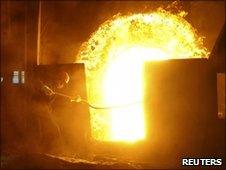China sees surge in trade surplus
- Published

Steel was one of the strongest export sectors in June
China has recorded a fresh surge in its trade surplus and exports, beating market expectations.
Exports for June were up 43.9% on the same month last year, while the $20bn (£13.2bn) trade surplus was the largest this year.
Analysts said the negative effect of the European debt crisis had not been as bad as feared.
The results are the first since China last month allowed its yuan currency to trade more freely against the dollar.
Western politicians have argued that the yuan is undervalued, giving China an unfair trading advantage.
'Slippery sands'
The trade surplus and export figures both beat market expectations.
Exports were worth $137.4bn in June, up 43.9% on June 2009, while import growth was around expectations at 34.1%.
Liu Nenghua, an economist with Bank of Communications in Shanghai, told Reuters: "Exports were better than expected because the negative impact from the European debt crisis was not as serious as the market had feared."
There have been expectations of a slowdown of growth in China and analysts believe that will still happen, although not as sharply as originally feared.
The strong trade figures for June might spark calls for the yuan controls to be relaxed further.
The yuan has gained just 0.78% since China's announcement, fuelling Western demands for more action.
A stronger yuan would dampen Chinese exports and boost home consumer spending on cheaper imported products.
Tom Orlik, of Stone & McCarthy Research Associates in Beijing, told Associated Press: "A resurgent trade surplus will clearly strengthen the argument for rapid appreciation of the yuan.
"But with the global recovery on slippery sands, the outlook for China's exports is not as stable as the last two months of data suggest."